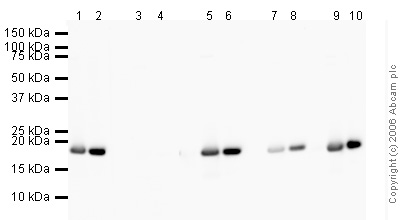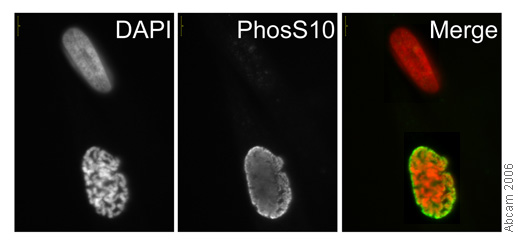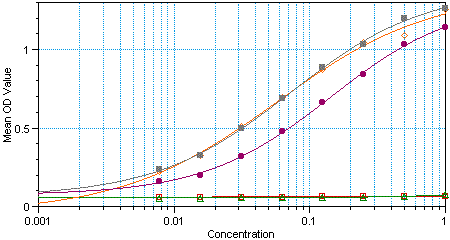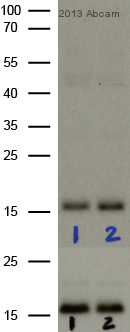Anti-Histone H3 (phospho S10) [mAbcam 14955] antibody – ChIP Grade (ab14955)抗组蛋白H3抗体
货号:ab14955
厂家:Abcam公司
规格:100ug
保存温度:-20℃ 和 2~8℃
货期:现货2~5天,期货2-3周
咨询: (重庆) (贵阳)
Anti-Histone H3 (phospho S10) [mAbcam 14955] antibody – ChIP Grade (ab14955)抗组蛋白H3抗体产品信息:
- Product name:Anti-Histone H3 (phospho S10) [mAbcam 14955] antibody – ChIP Grade
- Description
Mouse monoclonal [mAbcam 14955] to Histone H3 (phospho S10) – ChIP Grade
- Specificityab14955 recognises phospho S10 on Histone H3, even when K9 is tri methylated. It recognises a phospho S28 peptide by ELISA, but is not blocked by phospho S28 in WB.
- Tested applicationsIHC-P, ICC/IF, ChIP, IP, IHC-Fr, Flow Cyt, WB
- Species reactivity
Reacts with: Mouse, Rat, Human, Xenopus laevis, Arabidopsis thaliana, Fruit fly (Drosophila melanogaster), Indian Muntjac, African Green Monkey
Predicted to work with: Chicken, Saccharomyces cerevisiae, Caenorhabditis elegans, Schizosaccharomyces pombe, Zebrafish - Immunogen
Phospho S10 specific clone produced using a synthetic peptide derived from residues 1 – 100 of Human Histone H3, phosphorylated at S10 and tri methylated at K9.
Read Abcam's proprietary immunogen policy
Hybridomas were prepared and the resulting clones were positively screened by ELISA against the immunising tri methyl K9 and phospho S10 dimodified peptide. Clones were also positively screened against both tri methyl K9 and phospho S10 peptides. Clones were negatively screened against the unmodified version of the peptides. This clone binds to the tri methyl K9 and phospho S10 dimodified peptide and to the phospho S10 peptide, but not to the tri methyl K9 peptide or to equivalent unmodified Histone H3 peptide.
Properties
- FormLiquid
- Storage instructionsStore at +4°C short term (1-2 weeks). Aliquot and store at -20°C or -80°C. Avoid repeated freeze / thaw cycles.
- Storage bufferpH: 7.50
Preservative: 0.02% Sodium azide
Constituents: 5.88% Sodium citrate, Tris HCl, 2.9% Sodium chloride
Some batches contain 0.4M arginine -
Concentration 100 µg at 1 mg/ml
- PurityIgG fraction
- Clonality Monoclonal
- Clone numbermAbcam 14955
- IsotypeIgG1
- Research Areas
- Epigenetics and Nuclear Signaling
- Histones
- H3
- Phosphorylated
- Epigenetics and Nuclear Signaling
- Histones
- H3
- Methyl + Phospho
- Epigenetics and Nuclear Signaling
- ChIP'ing antibodies
- ChIP'ing antibodies
Applications
Our Abpromise guarantee covers the use of ab14955 in the following tested applications.
The application notes include recommended starting dilutions; optimal dilutions/concentrations should be determined by the end user.
| Application | Notes |
|---|---|
| IHC-P | IHC-P: Use at an assay dependent dilution. |
| ICC/IF | ICC/IF: Use at an assay dependent dilution. |
| ChIP | ChIP: Use at an assay dependent dilution. PubMed: 20864037See Abreview submitted on 5 January 2007. |
| IP | IP: Use at 80 µg/mg of lysate. |
| IHC-Fr | IHC-Fr: Use at an assay dependent concentration. PubMed: 21734301 |
| Flow Cyt | Flow Cyt: 1/1000. |
| WB | WB: Use a concentration of 1 – 5 µg/ml. Detects a band of approximay 17 kDa (predicted molecular weight: 15 kDa). |
Target
- FunctionVariant histone H3 which replaces conventional H3 in a wide range of nucleosomes in active genes. Constitutes the predominant form of histone H3 in non-dividing cells and is incorporated into chromatin independently of DNA synthesis. Deposited at sites of nucleosomal displacement throughout transcribed genes, suggesting that it represents an epigenetic imprint of transcriptionally active chromatin. Nucleosomes wrap and compact DNA into chromatin, limiting DNA accessibility to the cellular machineries which require DNA as a template. Histones thereby play a central role in transcription regulation, DNA repair, DNA replication and chromosomal stability. DNA accessibility is regulated via a complex set of post-translational modifications of histones, also called histone code, and nucleosome remodeling.
- Sequence similaritiesBelongs to the histone H3 family.
- Developmental stageExpressed throughout the cell cycle independently of DNA synthesis.
- Post-translational
modificationsAcetylation is generally linked to gene activation. Acetylation on Lys-10 (H3K9ac) impairs methylation at Arg-9 (H3R8me2s). Acetylation on Lys-19 (H3K18ac) and Lys-24 (H3K24ac) favors methylation at Arg-18 (H3R17me).
Citrullination at Arg-9 (H3R8ci) and/or Arg-18 (H3R17ci) by PADI4 impairs methylation and represses transcription.
Asymmetric dimethylation at Arg-18 (H3R17me2a) by CARM1 is linked to gene activation. Symmetric dimethylation at Arg-9 (H3R8me2s) by PRMT5 is linked to gene repression. Asymmetric dimethylation at Arg-3 (H3R2me2a) by PRMT6 is linked to gene repression and is mutually exclusive with H3 Lys-5 methylation (H3K4me2 and H3K4me3). H3R2me2a is present at the 3' of genes regardless of their transcription state and is enriched on inactive promoters, while it is absent on active promoters.
Specifically enriched in modifications associated with active chromatin such as methylation at Lys-5 (H3K4me), Lys-37 and Lys-80. Methylation at Lys-5 (H3K4me) facilitates subsequent acetylation of H3 and H4. Methylation at Lys-80 (H3K79me) is associated with DNA double-strand break (DSB) responses and is a specific target for TP53BP1. Methylation at Lys-10 (H3K9me) and Lys-28 (H3K27me), which are linked to gene repression, are underrepresented. Methylation at Lys-10 (H3K9me) is a specific target for HP1 proteins (CBX1, CBX3 and CBX5) and prevents subsequent phosphorylation at Ser-11 (H3S10ph) and acetylation of H3 and H4. Methylation at Lys-5 (H3K4me) and Lys-80 (H3K79me) require preliminary monoubiquitination of H2B at 'Lys-120'. Methylation at Lys-10 (H3K9me) and Lys-28 (H3K27me) are enriched in inactive X chromosome chromatin.
Phosphorylated at Thr-4 (H3T3ph) by GSG2/haspin during prophase and dephosphorylated during anaphase. Phosphorylation at Ser-11 (H3S10ph) by AURKB is crucial for chromosome condensation and cell-cycle progression during mitosis and meiosis. In addition phosphorylation at Ser-11 (H3S10ph) by RPS6KA4 and RPS6KA5 is important during interphase because it enables the transcription of genes following external stimulation, like mitogens, stress, growth factors or UV irradiation and result in the activation of genes, such as c-fos and c-jun. Phosphorylation at Ser-11 (H3S10ph), which is linked to gene activation, prevents methylation at Lys-10 (H3K9me) but facilitates acetylation of H3 and H4. Phosphorylation at Ser-11 (H3S10ph) by AURKB mediates the dissociation of HP1 proteins (CBX1, CBX3 and CBX5) from heterochromatin. Phosphorylation at Ser-11 (H3S10ph) is also an essential regulatory mechanism for neoplastic cell transformation. Phosphorylated at Ser-29 (H3S28ph) by MLTK isoform 1, RPS6KA5 or AURKB during mitosis or upon ultraviolet B irradiation. Phosphorylation at Thr-7 (H3T6ph) by PRKCBB is a specific tag for epigenetic transcriptional activation that prevents demethylation of Lys-5 (H3K4me) by LSD1/KDM1A. At centromeres, specifically phosphorylated at Thr-12 (H3T11ph) from prophase to early anaphase, by DAPK3 and PKN1. Phosphorylation at Thr-12 (H3T11ph) by PKN1 is a specific tag for epigenetic transcriptional activation that promotes demethylation of Lys-10 (H3K9me) by KDM4C/JMJD2C. Phosphorylation at Tyr-42 (H3Y41ph) by JAK2 promotes exclusion of CBX5 (HP1 alpha) from chromatin. Phosphorylation on Ser-32 (H3S31ph) is specific to regions bordering centromeres in metaphase chromosomes.
Ubiquitinated. Monoubiquitinated by RAG1 in lymphoid cells, monoubiquitination is required for V(D)J recombination. - Cellular localizationNucleus. Chromosome.
-
Database links
- Entrez Gene: 176359 Caenorhabditis elegans
- Entrez Gene: 31848 Fruit fly (Drosophila melanogaster)
- Entrez Gene: 33736 Fruit fly (Drosophila melanogaster)
- Entrez Gene: 3020 Human
- Entrez Gene: 3021 Human
- Entrez Gene: 15078 Mouse
- Entrez Gene: 15081 Mouse
- Entrez Gene: 100361558 Rat
-
Alternative names
- H3 3 like sequence MH921 antibody
- H3 3 like sequence MH921 antibody
- H3 3A antibody
Anti-Histone H3 (phospho S10) [mAbcam 14955] antibody – ChIP Grade images

Western blot – Histone H3 (phospho S10) antibody [mAbcam 14955] – ChIP Grade (ab14955)
All lanes : Anti-Histone H3 (phospho S10) [mAbcam 14955] antibody – ChIP Grade (ab14955) at 1 µg/ml
Lane 1 : Control HeLa Histone Prep 0.5ug
Lane 2 : Colcemid treated HeLa Histone prep 0.5ug
Lane 3 : Control HeLa Histone Prep 0.5ug with Human Histone H3 (tri methyl K9, phospho S10) peptide (ab15644) at 1 µg/ml
Lane 4 : Colcemid treated HeLa Histone prep 0.5ug with Human Histone H3 (tri methyl K9, phospho S10) peptide (ab15644) at 1 µg/ml
Lane 5 : Control HeLa Histone Prep 0.5ug with Human Histone H3 (unmodified ) peptide (ab7228) at 1 µg/ml
Lane 6 : Colcemid treated HeLa Histone prep 0.5ug with Human Histone H3 (unmodified ) peptide (ab7228) at 1 µg/ml
Lane 7 : Control HeLa Histone Prep 0.5ug with Human Histone H3 (phospho S10) peptide (ab11477) at 1 µg/ml
Lane 8 : Colcemid treated HeLa Histone prep 0.5ug with Human Histone H3 (phospho S10) peptide (ab11477) at 1 µg/ml
Lane 9 : Control HeLa Histone Prep 0.5ug with Human Histone H3 (phospho S28) peptide (ab14793) at 1 µg/ml
Lane 10 : Colcemid treated HeLa Histone prep 0.5ug with Human Histone H3 (phospho S28) peptide (ab14793) at 1 µg/ml
Secondary
Rabbit polyclonal to Mouse IgG H&L (HRP) at 1/5000 dilution
Performed under reducing conditions.
Predicted band size : 15 kDa
Observed band size : 17 kDa (why is the actual band size different from the predicted?)
Immunocytochemistry/ Immunofluorescence – Histone H3 (phospho S10) antibody [mAbcam 14955] (ab14955)This image was submitted as part of a review by Kirk McManus
Indian muntjac and HeLa cells were fixed in paraformaldehyde and labelled with ab14955 (1/2000 dilution) for 30 minutes. The above image contains an interphase and a prophase Indian muntjac cells immunofluorescently labelled with anti-PhosS10 (green) and counterstained with DAPI (red).

ELISA – Histone H3 (phospho S10) antibody [mAbcam 14955] (ab14955)
By ELISA, ab14955 detects:
the singly modified phospho S10 peptide and the dual modified phospho S10 and tri methyl K9 peptide (the orange and grey lines respectively),
less strongly detects the phospho S28 peptide (purple line),
does not detect the equivalent non-modified Histone H3 peptide for S10 or the singly modified tri methyl K9 peptide (the 2 lines at the bottom of the figure).The antibody recognises phospho S28 by ELISA (although a phospho S28 peptide does not block the antibody in Western blotting).

Flow Cytometry – Histone H3 (phospho S10) antibody [mAbcam 14955] – ChIP Grade (ab14955)This image is courtesy of an Abreview submitted by Dr Kirk McManus
ab14955 (1/1000) stainning a population of Human HeLa cells positive for Histone H3 (phospho S10). Cells were trypsizined, pelleted and fixed in ice cold ethanol. Cellular debris was eliminated and the FL2-A/FL2-W was used to eliminate clumping cells. For further experimental details please refer to abreview.
-
Western blot – Histone H3 (phospho S10) antibody [mAbcam 14955] (ab14955)
Lane 1 – 8 : Histone H3 (phospho S10) antibody [mAbcam 14955] (ab14955) at 0.5 ug/ml
Lane 1 : Control HeLa Histone prep at 5 ug
Lane 2 : Colcemid treated HeLa Histone prep at 5 ug
Lane 3 : Control HeLa Histone prep at 5 ug with Histone H3 peptide – unmodified (ab7228) at 1 ug/ml
Lane 4 : Colcemid treated HeLa Histone prep at 5 ug with Histone H3 peptide – unmodified (ab7228) at 1 ug/ml
Lane 5 : Control HeLa Histone prep at 5 ug with Histone H3 peptide – phospho S28 (ab14793) at 1 ug/ml
Lane 6 : Colcemid treated HeLa Histone prep at 5 ug with Histone H3 peptide – phospho S28 (ab14793) at 1 ug/ml
Lane 7 : Control HeLa Histone prep at 5 ug with Histone H3 peptide – phospho S10 (ab11477) at 1 ug/mlThe antibody is not blocked by a phospho S28 peptide by Western Blotting.

Western blot – Anti-Histone H3 (phospho S10) [mAbcam 14955] antibody – ChIP Grade (ab14955)Image courtesy of Richelle Sopko, Harvard University,U.S.A
All lanes : Anti-Histone H3 (phospho S10) [mAbcam 14955] antibody – ChIP Grade (ab14955) at 1/1000 dilution
Lane 1 : Wild type 0-4 hour old fruit fly embryo lysate
Lane 2 : 0-4 hour old fruit fly embryo lysate expressing wee RNAi
Secondary
Anti-mouse IgG, peroxidase-linked at 1/10000 dilution
developed using the ECL technique
Performed under reducing conditions.
Predicted band size : 15 kDa
Exposure time : 5 secondsImage courtesy of Richelle Sopko, Harvard University, U.S.A
Blocking: 10% BSA
wee shRNA embryos (lane 2) should display elevated phospho H3Ser10 levels relative to wild type
公司介绍:
Abcam位于英国的剑桥科学园,成立于1998年,专门生产和分销研究型抗体。主要创立人Jonathan Milner和实验室同事构思成立一间了解科研人员需要的网上抗体公司,理念是Abcam销售质量高的抗体,并提供zui全面、诚实、时新的说明书,快速的送货服务,及高效率的顾客和服务。我们的在线目录(www.abcam.cn) 已有差不多100,000种抗体和试剂,并不断添加,供应予全球百多个国家。Abcam于2005年11月在伦敦证券交易所上市,在美国马萨诸塞州、日本东京及香港均设有分公司。
Abcam 一直致力加强产品线,为使研究员更容易找到蛋白质研究试剂产品,在2011并购了美国的MitoSciences公司,加强了免疫分析方面的产品供应;同年也并购了英国的Ascent Scientific 公司,开展了生化试剂的供应。在2012年,Abcam并购了美国的Epitomics 公司,成为一家有领导地位的RabMAbs® 供应商。
Abcam 的 目标是给世界上zui好的抗体建立zui大的在线目录,为各地科学家提供尖端产品,成为各国科学界的重要伙伴。我们为所有产品提供来使客户获得预期的结 果。为提供高质量的抗体来指向尽可能多的靶蛋白,我们尽所能在尽可能多的应用和物种中检测每种抗体。我们相信诚信才是上策,在我们的上会发布有关我们 每一种产品的尽可能多的信息。
更多产品:
Abcamab1132Mouse monoclonal [1718] to Thyroid Hormone Receptor100ul3996Thyroid Hormone Receptor抗体一抗
Abcamab11320Rabbit polyclonal to gamma Tubulin – Centrosome Marker100ul3996gamma Tubulin抗体一抗
Abcamab11321Rabbit polyclonal to gamma Tubulin – Centrosome Marker100ul3996gamma Tubulin抗体一抗
Abcamab12085Mouse monoclonal [TLR3.7] to TLR350ug3885TLR3hystemcell一抗
Abcamab12086Goat polyclonal to SAP102200ug3996SAP102hystemcell一抗
Abcamab12087Mouse monoclonal [8RB13] to RNA polymerase beta50ul3996RNA polymerase betahystemcell一抗
Abcamab12088Mouse monoclonal [2G10] to RNA polymerase sigma 7050ul3996RNA polymerase sigma 7hystemcell一抗
Abcamab12089Mouse monoclonal [1TB18] to TATA binding protein TBP – ChIP Grade50ul3996TATA binding protein TBPhystemcell一抗
Abcamab1209Rabbit polyclonal to V5 tag (FITC)250ug3996V5 taghystemcell一抗
Abcamab12090Mouse monoclonal [4Y11] to RNA polymerase II RPB1150ul3996RNA polymerase II RPB11hystemcell一抗
Abcamab12091Mouse monoclonal [1GFP63] to GFP50ul3996GFPhystemcell一抗
Abcamab12092Mouse monoclonal [4WG2] to RNA polymerase II RBP850ul3996RNA polymerase II RBP8hystemcell一抗
Abcamab12093Goat polyclonal to PSD95100ug3996PSD95hystemcell一抗
Abcamab12094Mouse monoclonal [IIB1] to TFIIB – ChIP Grade50ul3996TFIIBhystemcell一抗
Abcamab12097Goat polyclonal to PSD93 – Synaptic Marker100ul3996PSD93hystemcell一抗
Abcamab12098Rabbit polyclonal to Arp8100ug3996Arp8hystemcell一抗
Abcamab12099Rabbit polyclonal to Arp5250ug3996Arp5hystemcell一抗
Abcamab12104Rabbit polyclonal to APH1a100ug3996APH1ahystemcell一抗
Abcamab12107Rabbit polyclonal to Pin1100ug3996Pin1hystemcell一抗
Abcamab12108Rabbit polyclonal to Glutamate Receptor 1 (AMPA subtype) (phospho T840)100ug3996Glutamate Receptor 1hystemcell一抗
Abcamab12109Rabbit polyclonal to p40100ug3996p40hystemcell一抗
Abcamab1211Mouse monoclonal [OX42] to CD11b/c equivalent100ug4418CD11b/chystemcell一抗
Abcamab12111Rabbit polyclonal to SP150ul3996SP1hystemcell一抗
Abcamab12112Rabbit polyclonal to STAT4100ul3996STAT4hystemcell一抗
Abcamab12113Rabbit polyclonal to STAT5a50ul3996STAT5ahystemcell一抗
Abcamab12114Rabbit polyclonal to TACI50ug3996TACIhystemcell一抗
Abcamab12116Mouse monoclonal [108A429] to NAK50ug3996NAKhystemcell一抗
Abcamab12118Rabbit polyclonal to TLR250ug3996TLR2hystemcell一抗
Abcamab12119Mouse monoclonal [86B1153] to TLR650ug3996TLR6hystemcell一抗
Abcamab1212Mouse monoclonal [OX42] to CD11b/c equivalent (FITC)500ul3996CD11b/chystemcell一抗
Abcamab12120Mouse monoclonal [44C143] to TLR850ug3996TLR8hystemcell一抗
Abcamab12121Mouse monoclonal [26C593] to TLR950ug3996TLR9hystemcell一抗
Abcamab12122Mouse monoclonal [33A1293] to TRAF250ug3996TRAF2hystemcell一抗
Abcamab12123Mouse monoclonal [55A219] to TRAF550ug3996TRAF5hystemcell一抗
Abcamab12124Mouse monoclonal [55B709.3] to TRAIL50ug3996TRAILhystemcell一抗
Abcamab12125Mouse monoclonal [12A380] to RANKL50ug3996RANKLhystemcell一抗
Abcamab12126Rabbit polyclonal to TROY50ug3996TROYhystemcell一抗
Abcamab12127Mouse monoclonal [pool] to TTF150ul3996TTF1hystemcell一抗
Abcamab12128Rabbit polyclonal to USF150ul3996USF1hystemcell一抗
Abcamab12131Rabbit polyclonal to Twilight100ug3996Twilighthystemcell一抗
Abcamab12132Rabbit polyclonal to YY1100ul3996YY1hystemcell一抗
Abcamab12134Mouse monoclonal [6A920] to IKB alpha50ug3996IKB alphahystemcell一抗
Abcamab12135Mouse monoclonal [39A1431] to IKB alpha (phospho S32+S36)50ug3996IKB alphahystemcell一抗
Abcamab12136Rabbit polyclonal to IKB epsilon50ul3996IKB epsilonhystemcell一抗
Abcamab12137Rabbit polyclonal to IKK gamma500ul3996IKB gammahystemcell一抗
Abcamab12139Mouse monoclonal [10AG2] to IKK beta50ug3996IKK betahystemcell一抗
Abcamab12140Mouse monoclonal [10A9B6] to IKK beta50ug3996IKK betahystemcell一抗
Abcamab12141Mouse monoclonal [46B844] to IKK gamma50ug3996IKK gammahystemcell一抗
Abcamab12142Mouse monoclonal [72B587] to IKKi/IKKe50ug3996IKK iota/IKK epsilonhystemcell一抗
Abcamab12143Rabbit polyclonal to IKKi/IKKe50ug3996IKK iota/IKK epsilonhystemcell一抗
Abcamab12145Rabbit polyclonal to NFkB p6550ul3996NFkB p65hystemcell一抗
Abcamab12146Rabbit polyclonal to NFkB p6550ul3996NFkB p65hystemcell一抗
Abcamab12147Rabbit polyclonal to Geminin50ug4418Gemininhystemcell一抗
Abcamab12148Rabbit polyclonal to YB1100ug4418YB1hystemcell一抗
Abcamab12149Histone H3 peptide100ug2010Histone H3蛋白/多肽多肽
Abcamab1215Mouse monoclonal [BB12+733] to CD3+CD8 (Dual color: FITC+PE)500ul3996CD3/CD8hystemcell一抗
Abcamab12151Rabbit polyclonal to STEP/PTPN5100ug3996STEP/PTPN5hystemcell一抗
Abcamab12152Rabbit polyclonal to HePTP/PTPN7200ul3996HePTP/PTPN7hystemcell一抗
Abcamab12153Rabbit polyclonal to PCPTP1200ul3996PTPRhystemcell一抗
Abcamab12154Rabbit polyclonal to PTPIA2/PTPRN100ug3996PTPIA2/PTPRNhystemcell一抗
Abcamab12157Rabbit polyclonal to PLK1 (phospho T210)100ug3996Plk1hystemcell一抗
Abcamab12159Rabbit polyclonal to Mre11 – ChIP Grade100ug3996Mre11hystemcell一抗
Abcamab12161Rabbit polyclonal to FOXO1A50ul4274FOXO1Ahystemcell一抗
Abcamab12162Rabbit polyclonal to FOXO3A – ChIP Grade50ul4274FOXO3Ahystemcell一抗
Abcamab12163Rabbit polyclonal to KAT1/HAT150ul3996HAT1hystemcell一抗
Abcamab12164Rabbit polyclonal to KAT1/HAT150ul3996HAT1hystemcell一抗
Abcamab12165Rabbit polyclonal to SMARCA2/BRM100ul3996BRM/SMARCA2hystemcell一抗
Abcamab12166Rabbit polyclonal to SMARCA2/BRM100ul3996BRM/SMARCA2hystemcell一抗
Abcamab12167Rabbit polyclonal to SNF5 – ChIP Grade100ul3996SMARCB1hystemcell一抗
Abcamab12168Mouse monoclonal [HDAC1-21] to HDAC1100ul3996HDAC1hystemcell一抗
Abcamab11322Mouse monoclonal [TUB-11] to epsilon Tubulin100ul3996epsilon Tubulin抗体一抗
Abcamab11323Mouse monoclonal [6-11B-1] to Tubulin (acetyl K40)100ul3996Tubulin抗体一抗
Abcamab11324Mouse monoclonal [B3] to Tubulin – Polyglutamylated100ul4274Tubulin抗体一抗
Abcamab11325Mouse monoclonal [TUB-1A2] to Tubulin100ul3996Tubulin抗体一抗
Abcamab11326Mouse monoclonal [100/2] to alpha Adaptin100ul3996alpha Adaptin抗体一抗
Abcamab11327Mouse monoclonal [100/1] to AP1+2 beta1 00ul3996beta 1/2 Adaptin抗体一抗
Abcamab11328Mouse monoclonal [100/3] to gamma Adaptin100ul3996gamma Adaptin抗体一抗
Abcamab11329Mouse monoclonal [AP180-I] to AP180100ul3996AP18抗体一抗
Abcamab1132Mouse monoclonal [1718] to Thyroid Hormone Receptor100ul3996Thyroid Hormone Receptorhystemcell一抗
Abcamab11320Rabbit polyclonal to gamma Tubulin – Centrosome Marker100ul3996gamma Tubulinhystemcell一抗
Abcamab11321Rabbit polyclonal to gamma Tubulin – Centrosome Marker100ul3996gamma Tubulinhystemcell一抗
Abcamab11322Mouse monoclonal [TUB-11] to epsilon Tubulin100ul3996epsilon Tubulinhystemcell一抗
Abcamab11323Mouse monoclonal [6-11B-1] to Tubulin (acetyl K40)100ul3996Tubulinhystemcell一抗
Abcamab11324Mouse monoclonal [B3] to Tubulin – Polyglutamylated100ul4274Tubulinhystemcell一抗
Abcamab11325Mouse monoclonal [TUB-1A2] to Tubulin100ul3996Tubulinhystemcell一抗
Abcamab11326Mouse monoclonal [100/2] to alpha Adaptin100ul3996alpha Adaptinhystemcell一抗
Abcamab11327Mouse monoclonal [100/1] to AP1+2 beta1 00ul3996beta 1/2 Adaptinhystemcell一抗
Abcamab11328Mouse monoclonal [100/3] to gamma Adaptin100ul3996gamma Adaptinhystemcell一抗
Abcamab11329Mouse monoclonal [AP180-I] to AP180100ul3996AP18hystemcell一抗
Abcamab1133Rabbit polyclonal to GABARAP100ul3996GABARAPhystemcell一抗
Abcamab11330Mouse monoclonal [C6G9] to Carcino Embryonic Antigen CEA200ul3996CEAhystemcell一抗
Abcamab11331Mouse monoclonal [TD.1] to Clathrin heavy chain100ul3996Clathrin heavy chainhystemcell一抗
Abcamab11333Mouse monoclonal [1B10] to Fibroblast Surface Protein 200ul3996Fibroblast Surface Proteinhystemcell一抗
Abcamab11334Mouse monoclonal [LN-5] to Macrophage200ul3996Macrophagehystemcell一抗
Abcamab11335Mouse monoclonal [45M1] to Gastric Mucin 200ul3996Mucin Gastrichystemcell一抗
Abcamab11336Rabbit polyclonal to Parvin alpha50ul3996Parvin alphahystemcell一抗
Abcamab11337Rabbit polyclonal to l Afadin100ul3996l Afadinhystemcell一抗
Abcamab11338Rabbit polyclonal to l+S Afadin 100ul3996l/S Afadinhystemcell一抗
Abcamab11339Mouse monoclonal [FA-5] to N Cadherin100ul3996N Cadherinhystemcell一抗
Abcamab1134Rabbit polyclonal to GABA B Receptor 2100ul3996GABA B Receptor 2hystemcell一抗
Abcamab11340Mouse monoclonal [GC-4] to N Cadherin100ul3996N Cadherinhystemcell一抗
Abcamab11342Mouse monoclonal [CH-19] to pan Cadherin – Plasma Membrane Marker (FITC)100ul3996Cadherin panhystemcell一抗
Abcamab11343Rabbit polyclonal to CASK100ul3996CASKhystemcell一抗
Abcamab11346Rabbit polyclonal to alpha 1 Catenin100ul3885alpha 1 Cateninhystemcell一抗
Abcamab11347Rabbit polyclonal to alpha 2 Catenin100ul3996alpha 2 Cateninhystemcell一抗
Abcamab11348Mouse monoclonal [15B8] to beta Catenin (Cy3 ®)100ul3996beta Cateninhystemcell一抗
Abcamab11349Mouse monoclonal [BC-76] to beta Catenin (phospho S33)50ul3996beta Cateninhystemcell一抗
Abcamab1135Rabbit polyclonal to GABA B Receptor 1100ul3996GABA B Receptor 1hystemcell一抗
Abcamab11350Mouse monoclonal [BC-22] to beta Catenin (phospho S33+S37)50ul3996beta Cateninhystemcell一抗
Abcamab1133Rabbit polyclonal to GABARAP100ul3996GABARAP抗体一抗
更多详情,请:

